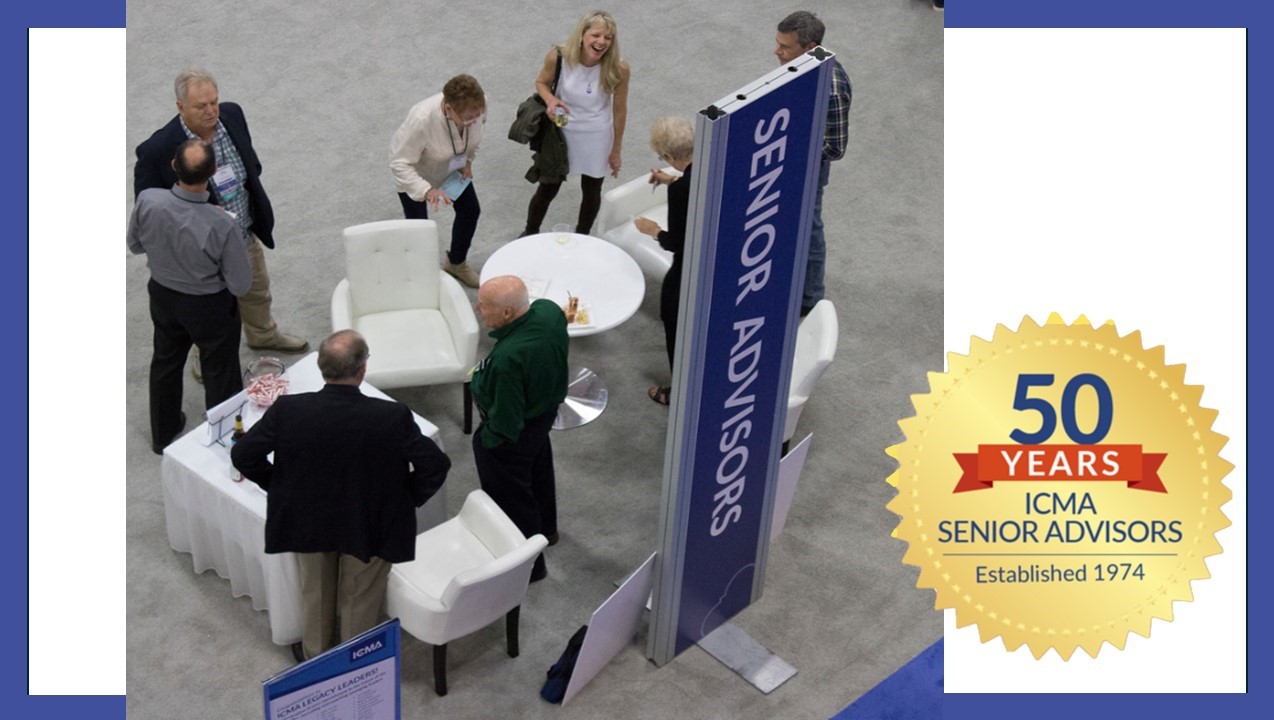
When I was selected in 2022 as the volunteer coordinator for the ICMA Senior Advisor program, my first task was to figure out how to follow an ICMA legend like Greg Bielawski, who served in the role for 17 years. Upon his retirement from the coordinator role, Greg was honored at the 2022 ICMA Annual Conference in Columbus, Ohio, as a fitting tribute to his contributions to the program, ICMA members, and local government.
The Senior Advisor program is celebrating its fiftieth anniversary this year, with 112 senior advisors in 30 states, yet we often find that many folks aren’t aware of this tremendous service we offer to ICMA members. You will see a series of PM articles from senior advisors in the coming months on activities within their states, as our number-one goal is to create more visibility for the program.
In reviewing the history of the program, I came across an article from 1973, when the idea for “a program of volunteers in public service” was first floated by Wes McClure, city manager of San Leandro, California, and an ICMA Executive Board vice president. The article stated, “A key element of the program is to provide managers who are about to retire with an opportunity for continued public service to the profession.” Wes McClure was the first senior advisor after the program, with its original name, Range Riders, was established in 1974.
In 2013, an ICMA-appointed committee changed the program to Senior Advisors to better describe the role and its primary emphasis on providing advice and support to members. The committee also strengthened the program guidelines for its participants. It’s important to note that senior advisors are volunteers. We are not consultants and do not respond to RFPs or receive any compensation from the local governments we assist. (Although I was once gifted a city coffee mug from a city council after assisting with their goal-setting process.) Senior advisors are bound by the ICMA Code of Ethics and take very seriously this ethical commitment, even as retired managers.
Within the program guidelines and agreements between ICMA and state associations, senior advisors provide support in whatever ways are needed in their state. In Florida, that can include working through the Florida League of Cities or Association of Counties to provide support for smaller local governments with annual goal setting and strategic planning. As we well know, a stable elected body makes for a more comfortable tenure for city/county managers. In that regard, Florida senior advisors are also called upon to present on form of government (representing ICMA/FCCMA as “local government experts”) and to work with smaller communities (under 2,500 in population) on city manager recruitment.
A large part of our efforts is support of the Members in Transition (MIT) program. As senior advisors, we have confidential conversations with MITs on issues they are facing, whether it be communications with an elected body, transitioning in a new mayor or councilmember, or career advice. We also work with the ICMA coaching program, CoachConnect, and we support ICMA student chapters at local universities.
This past program year, the ICMA support staff and I have been updating policies and guidelines for senior advisors, recruiting new senior advisors, and improving the process of reporting our activities quarterly to state associations and ICMA. We have established several important goals for 2025:
• Increasing the awareness among ICMA members of the availability of senior advisors as sounding boards on issues.
• Strengthening our support of ICMA student Chapters.
• Providing training to senior advisors on current issues facing our members and our communities.
• Strengthening ties to the ICMA Coaching program (10 of our members were certified as ICMA coaches last year at the annual conference).
• Ensuring that we support members in transition in their efforts (resume review, interview techniques, and personal support).
We are also developing a central depository of best practices in each of our 30 states, which then can then be utilized by other states. This will include best practices on topics such as MIT support, charter review presentations on local government structure and the council-manager plan, orientation programs for new managers, and recruitment assistance guidelines.
We may seem small—only 112 senior advisors to cover 30 participating states—but our ranks include former ICMA presidents and executive board members, state presidents, former ICMA credentialing and ethics committee members, and ICMA award recipients. A number of senior advisors have achieved ICMA life membership, some with 40-plus years in local government management.
So, if you’re an ICMA member who is retiring soon, consider becoming a senior advisor. Apply through your state association, who will then submit your application to ICMA. And if you’re a first-time manager, an MIT, working with a challenging elected body in a new community, or want coaching assistance or a professional mentor, senior advisors stand by ready to assist you! You can find more information through your state association or check the full list of senior advisors for each state.
If you’re attending the ICMA Annual Conference in Pittsburgh, you can find us in the Senior Advisor area of the ICMA member pavilion, where we can give you more information on the program. We look forward to working with you!
PAM BRANGACCIO, ICMA-CM, is the volunteer coordinator of the ICMA Senior Advisors program and a Florida senior advisor in the Tampa Bay area.
New, Reduced Membership Dues
A new, reduced dues rate is available for CAOs/ACAOs, along with additional discounts for those in smaller communities, has been implemented. Learn more and be sure to join or renew today!
